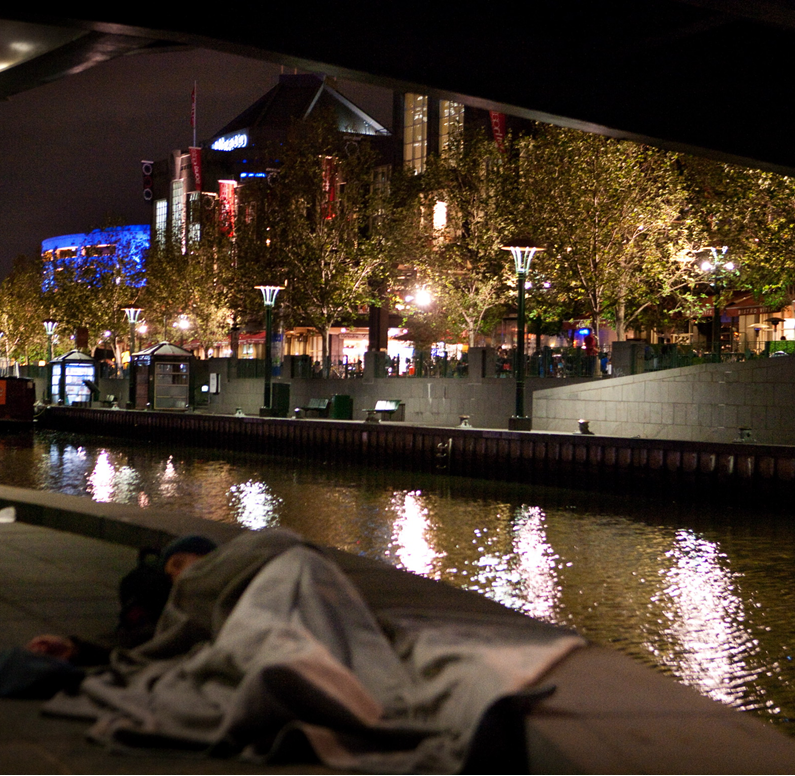.jpg) Anne Mitchell 58, has run a service for young homeless people in Melbourne for seven years without any government funding. She has worked for the homeless for the last 13 years.
Anne Mitchell 58, has run a service for young homeless people in Melbourne for seven years without any government funding. She has worked for the homeless for the last 13 years.“The steps are my ‘office’,” she says. “As soon as you take government money you have to work to guidelines that may not match what young homeless people need. For example, the government might put limits on how many times we help a person or what age we can work with them until. But we keep helping as long as the young person needs us to.” .png)
.png)
Anne is the only full-time worker for Steps Outreach Service, part of the non-denominational Concern Australia group. She has a part-time youth worker and, she says, a wonderful team of volunteers.
Rotary clubs around Melbourne have supported Steps for more than a decade. Southbank RC helped Steps create a book of poetry by homeless people matched with photography by secondary school students and Central Melbourne-Sunrise RC has provided close to 600 Christmas hampers and over 500 survival packs (containing toiletries). Many other Rotary clubs have also provided support over the years, including Albert Park and Port Melbourne.
She says, “We told one young boy who had not eaten all day, that he needn’t go hungry because....................

he could eat free meals at charity kitchens. He said, ‘Oh no, that food’s for poor people, I’ve only been homeless seven weeks.’ “One homeless girl was still of primary school age but was hanging out in the city. She told us that her family was ‘very bad’. That could mean anything from drug or alcohol users, mentally unwell parents, crime, family breakdown and violence or abuse from step-parents.”
Another girl told Anne, “I heard some kid on a train carrying on because she has to do the dishes, I wish I had someone to tell me to do the dishes.” A girl wrote of life at night trying to find a safe spot from “the perverts, drunks and other aggressive kids: I can’t sleep properly – I have to hear if someone’s coming.”
Anne goes to the Flinders Street station steps Wednesday and Thursday nights with two or three volunteers and makes contact with up to 50 young homeless a week. Then she and helpers drive to see them and provide support during the day – anywhere from Werribee to Pakenham. They take them to government agencies and help them fill forms and make a case for help with family problems, housing, detox, police, school or health. In emergencies, Steps can at least provide blankets, a jumper and a toothbrush. “Often crisis accommodation is simply not available,” Anne says.
Steps is funded by charity trusts and donations but is struggling on $100,000 a year for all expenses. Anne says charity trusts every year are besieged by extra groups seeking funding. Steps now faces the prospect of losing its part-time youth worker. “We can always find something to like about the kids,” she says. “It might be their loyalty and generosity to their friends, or their struggles with severe family problems. We avoid switching helpers because the kids get sick of having to tell their stories all over again to a new person.”
Anne says young people may be hostile at first but soften when people care about them as individuals. On one volunteer’s first night, she got heaps of abuse from a homeless girl. She backed away, scared. The next night, Anne told her to do the opposite. If the girl abused her, she said, move forward and give her a hug and say ‘Hi!’. This worked and they became very close. “Young people often have a hard shell and want to ‘test you out’ by seeing if they can drive you away,” Anne says.
“The kids have often become socially isolated and we’re the first adult to befriend them. Our volunteers learn to separate the bad behavior from the hurt person underneath. If we can get them into a room and bed, we still have to keep helping them until they link back into mainstream society again.
“We always remember their birthdays and celebrate if a baby arrives. They keep coming every year to our Christmas lunch in Collingwood where they all get a hot lunch and a Rotary hamper.“
“We always remember their birthdays and celebrate if a baby arrives. They keep coming every year to our Christmas lunch in Collingwood where they all get a hot lunch and a Rotary hamper.“
Chronically homeless people impose a huge economic cost on society, Anne says. One homeless woman from the age of 12 to 21 cost the State $5.5 million in sanctions and support.
Next May 8, Steps Outreach Service celebrates its 30th anniversary with a Concert for Homelessness.
